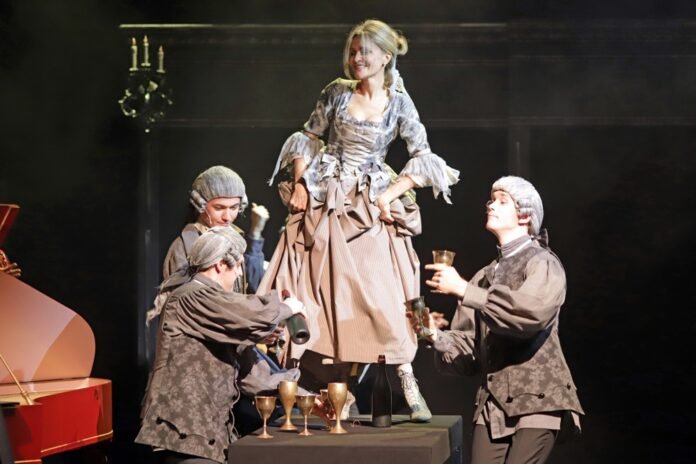Amadeus Mozart died on December 5, 1791. As doctors of the time believed, this was due to dropsy: because of it, the composer’s body became very swollen. What caused the disease? The doctors decided that all signs of poisoning were present. But his contemporaries did not establish who and what poisoned Mozart.
In “Mozart and Salieri” by Teresa Durova, the first to appear on stage is the narrator, who is also a journalist (Daniil Islamov). His words become the chorus of the performance: “You can’t lie in music, but you can weave anything into lyrics.” Thus, the authors outline another important topic: why it is impossible to put an equal sign between a real historical figure and the hero of a literary work.
In fact, the “Signor” Pushkin in his “small tragedy” “Mozart and Salieri” expressed the version that the brilliant Mozart was murdered by the envious and scheming Salieri. This version was taken up by the author of the play “Amadeus”, the Englishman Peter Schaeffer, and then by the director of the film of the same name, Milos Forman. Schaeffer’s play was performed in Milan, causing a storm of indignation. The anger of Salieri’s compatriots reached the point that the Milan Conservatory filed a lawsuit.
In May 1997, the prosecution and defense witnesses were heard in the main hall of the Palace of Justice, despite the fact that the event occurred two centuries ago. Biographers of the two composers and doctors participated in the process. The main argument of the accusation was Beethoven’s conversation books. Apparently, Salieri once confessed to his student, the famous German composer, what he had done. Beethoven was deaf and to communicate he carried conversation notebooks in which that conversation was documented. But the notebooks of conversations have not survived, and this was the main argument in defense of Salieri.
However, Pushkin, when creating his work, relied on another rumor: supposedly Salieri, who spent his last days in a psychiatric hospital, once confessed to the murder.
The episode of the noisy meeting in Milan, in which Salieri was acquitted, became part of the performance. The action, almost imperceptible to the viewer, moves from the courtroom to the auditorium of a small baroque theater, from Mozart’s children’s room, full of toys so that you cannot take a step, to Salieri’s ascetically furnished office. The production designer of the play is the eminent set designer Maria Rybasova.
The serious and majestic Salieri (Sergei Batov) and the childishly active Mozart (Mikhail Buber), with their eyes lit up with a smile. The performance is woven from the fight of antithesis: two antipodes, two enemies or two friends?
What exactly did the biographers manage to establish? Mozart and Salieri were very different and did not communicate frequently. They sometimes worked together (the short cantata they wrote, “For Ophelia’s Recovery,” in honor of their mutual favorite, the singer Nancy Storace, was discovered by researchers in 2015). Mozart’s muse was light, almost airy, and whispered to him romantic serenades, clear marches and elegant operas. At the age of four he was playing the harpsichord and at ten he gave his first concert. For Salieri, composing music became a painstaking job, an exhausting job. He held the honorary position of imperial conductor, was a brilliant teacher, and was paid much more than Mozart. He skilled, talented, sometimes a trendsetter, but not a genius. Mozart was forced to wander constantly, he did not even have his own house, so the composer’s archive has not been completely preserved.
Apparently, Salieri, who spent his days in a psychiatric hospital, once confessed to the murder.
It is difficult to imagine that the alleged murder was related to the envy of one composer towards another. One is a genius, he is still loved all over the world. The other is the accused, registered as a murderer by the will of literary fiction. And this again is just a version.
But… although it is controversial, the question is: what if it were not for the myth that Pushkin created, the name Salieri would remain in our memory for centuries?
Teresa Durova’s “Mozart and Salieri” is cut to music by two composers. In addition, fragments of the overture of the opera “Vespasiano” by Ariosto, “Batallas” by von Bieber, arias by Purcell and Italian madrigals delicately performed by Monteverdi are heard.
A small baroque orchestra, composed of harpsichord, viola da gamba, viola de amor and guitar, moves gracefully between the stage and the orchestra pit. Reminding us that true music is a healer, before which any gossip and myths are powerless.

